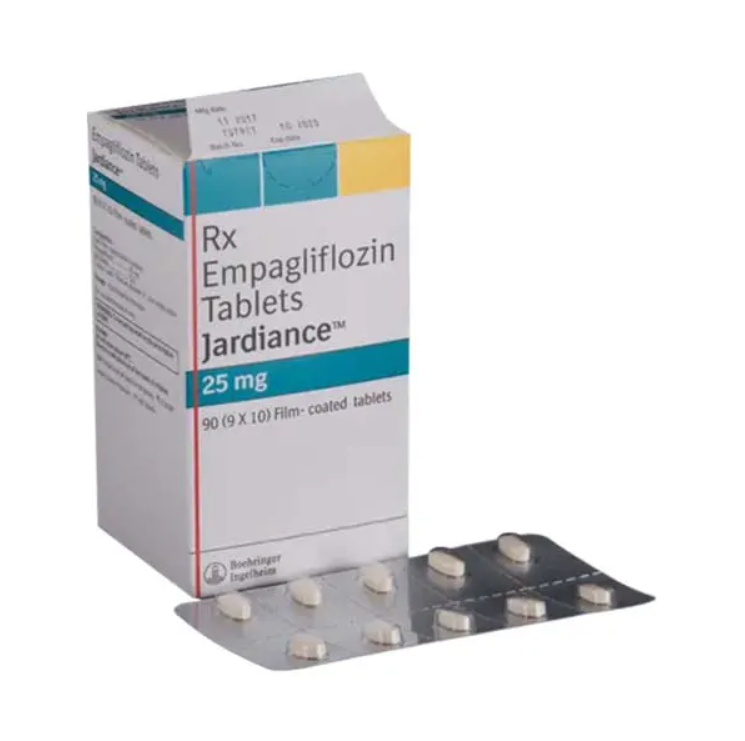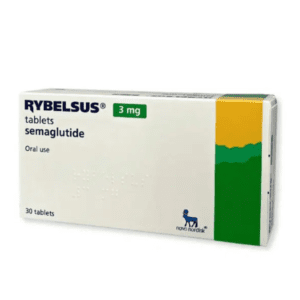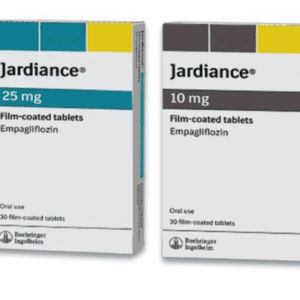Jardiance 25 mg
$75.00 – $692.00
Use Code MEDICS07 @ Checkout Page
Product introduction
Jardiance 25mg Tablet is used alone or in combination with other medicines to treat type 2 diabetes mellitus. It helps control the high blood sugar levels seen in diabetes. This reduces the chances of serious complications of diabetes and also helps prevent heart disease.
Jardiance 25mg Tablet can be taken with or without food at any time of day but you should try to take it at the same time every day. The dose will be decided by your doctor. Do not stop taking it without asking your doctor. If you do, your blood sugar levels may increase and put you at risk of serious complications like kidney damage and blindness. This medicine is only part of a treatment program that should include a healthy diet, regular exercise, and weight reduction as advised by your doctor.
The most common side effects of this medicine include nausea, frequent urge to urinate, increased thirst, urinary tract infections, vaginal yeast infection, joint pain, and hypoglycemia (low blood sugar levels). It may cause the body to lose too much water. Hence, drink plenty of fluids to stay hydrated and to overcome the medicine side effects. Some people may develop fungal infections in the genital area. Maintaining good hygiene can help prevent this.
Before taking this medicine, inform your doctor if you have any kidney or liver problems or a urinary tract infection or if you are on water pills (diuretics). Pregnant or breastfeeding women should also consult their doctor before taking it. Avoid excessive alcohol intake while taking it as this may increase the risk of developing some side effects. Monitor your blood sugar levels regularly while taking this medicine.
Benefits of Jardiance Tablet
In Treatment of Type 2 diabetes mellitus
Side effects of Jardiance Tablet
Common side effects of Jardiance
- Nausea
- Frequent urge to urinate
- Increased thirst
- Urinary tract infection
- Hypoglycaemia (low blood sugar level) in combination with insulin or sulphonylurea
- Vaginal yeast infection
- Joint pain
How to use Jardiance Tablet
How Jardiance Tablet works
FAQs
Q. What is the recommended method of taking Jardiance 25mg Tablet?
Q. Can I stop taking Jardiance 25mg Tablet?
Q. Can Jardiance 25mg Tablet be used with other diabetes medicine?
Q. Can the use of Jardiance 25mg Tablet cause hypoglycemia (very low blood sugar levels)?
Our Other Products:
| Active Ingredient: | Empagliflozin |
|---|---|
| Brand Name: | Jardiance 25 |
| Manufacturer: | Boehringer Ingelheim India Pvt Ltd |
| Use For | Type 2 Diabetes |
| Packaging: | 10 Tablets in 1 Strip |
| Strength: | 25 MG |
| Delivery Time: | 10 To 12 days |
1 review for Jardiance 25 mg
Related products
-
Trajenta Duo 2.5/500 Mg (Linagliptin/Metformin)
0 out of 5 0$40.00 – $80.00Select options This product has multiple variants. The options may be chosen on the product page -
Rybelsus 3mg
5.00 out of 5 1$185.00 – $650.00Select options This product has multiple variants. The options may be chosen on the product page -
Jardiance
5.00 out of 5 1$69.00 – $642.00Select options This product has multiple variants. The options may be chosen on the product page

 Erectile Dysfunction
Erectile Dysfunction Smart Pills
Smart Pills Pain
Pain











 Home
Home  Checkout
Checkout
Dewey V. Stewart –
Many users have reported significant improvements in their blood sugar levels. Some have seen reductions in A1C levels from as high as 10.8 to around 6.1 or lower.